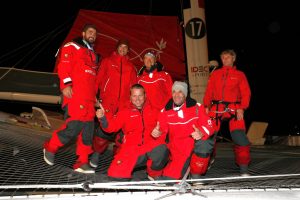

On Sunday, a little before 20:00, Francis Joyon and his five crewmembers cast off from the port of Brest, to guide Idec Sport to the Jules Verne Trophy start line between Ushant and Lizard Point. At 22:14, the six men went over the start line. The timer is now ticking for the Idec Sport trimaran as it vies to improve the record set by Loïck Peyron in 2012.

In a hurry to get going after seeing their hopes of setting off foiled twice already, the crew decided to go looking for favorable winds on the other side of a low. They need to cross this weather system for a distance of fifty miles or so before reaching powerful northerly winds which will hopefully set the lively pace they’re after as they set off to conquer the absolute speed record for sailing around the world. The six men were initially expected to go over the line sometime between midnight and one in the morning.
Long suspense
Should they go or should they stay? And if they go, then when exactly? In Code Green since the start of Sunday morning, Francis Joyon, in constant contact with Marcel van Triest, IDEC SPORT’s router, remained on the alert on Sunday afternoon even if he was still uncertain about his chances of making it to the Jules Verne Trophy start line with his crew. The uncertainty was due to unstable weather, which nevertheless opened up an opportunity that the skipper of the 31-metre trimaran was reluctant to let slip away.
“The weather situation at the start isn’t necessarily easy because we need to progress in light winds before going over the line. But we’re going because we think that it’s better to try than not to try – all the more so because once we get over this pre-departure weather difficulty, the rest of the weather situation looks good. A fine connection to the South Atlantic is possible thanks to a front breaking away from Cabo Frio in Brazil. If we manage to catch it, it could take us to the Cape of Good Hope in a decent time,” explained Francis Joyon before leaving the deck.
“We’re still glad to be setting off even if it’s a bit of an unusual situation to be leaving from a low, associated with light winds. I’ve always set off in strong winds when I’ve hunted this record in the past. This is an experience, but we’re here to learn and we’re still going to learn a lot from this new attempt,” he added.
A “tight” time to beat
Let’s remember that to beat the reference time set in 2012 by Loïck Peyron and his thirteen-man crew, Francis Joyon, Bernard Stamm, Alex Pella, Gwénolé Gahinet, Clément Surtel and Boris Herrmann will need to knock off the three-cape route in under 45 days, 42 minutes and 53 seconds. A “tight” result says the IDEC SPORT skipper, which means that he can’t afford to lose any time in getting to the seas of the South, requiring a passage to the Equator in under 6 days, and the Cape of Good Hope in between 12 and 13 days.
Source : www.idecsport-sailing.com
Notifications